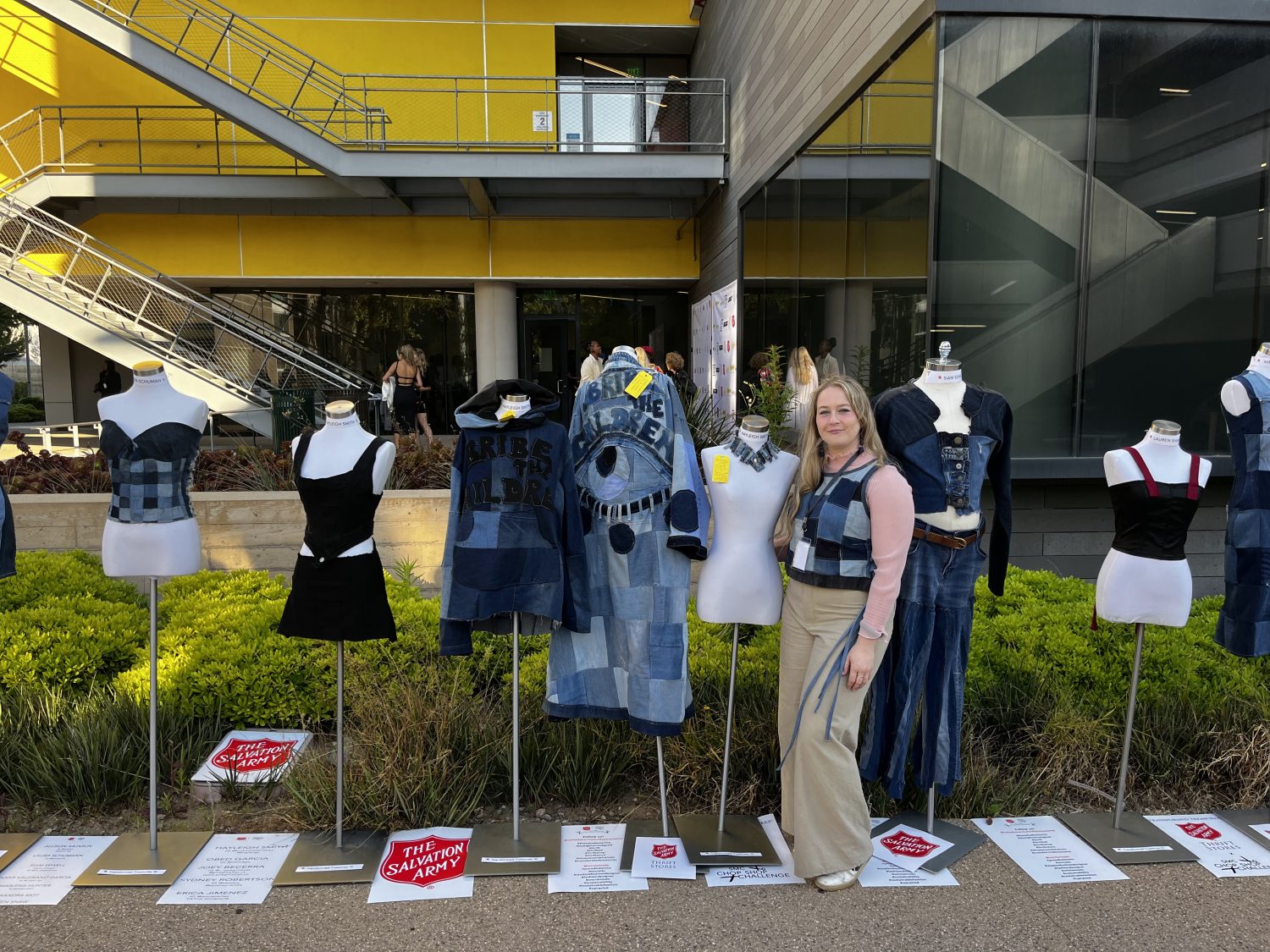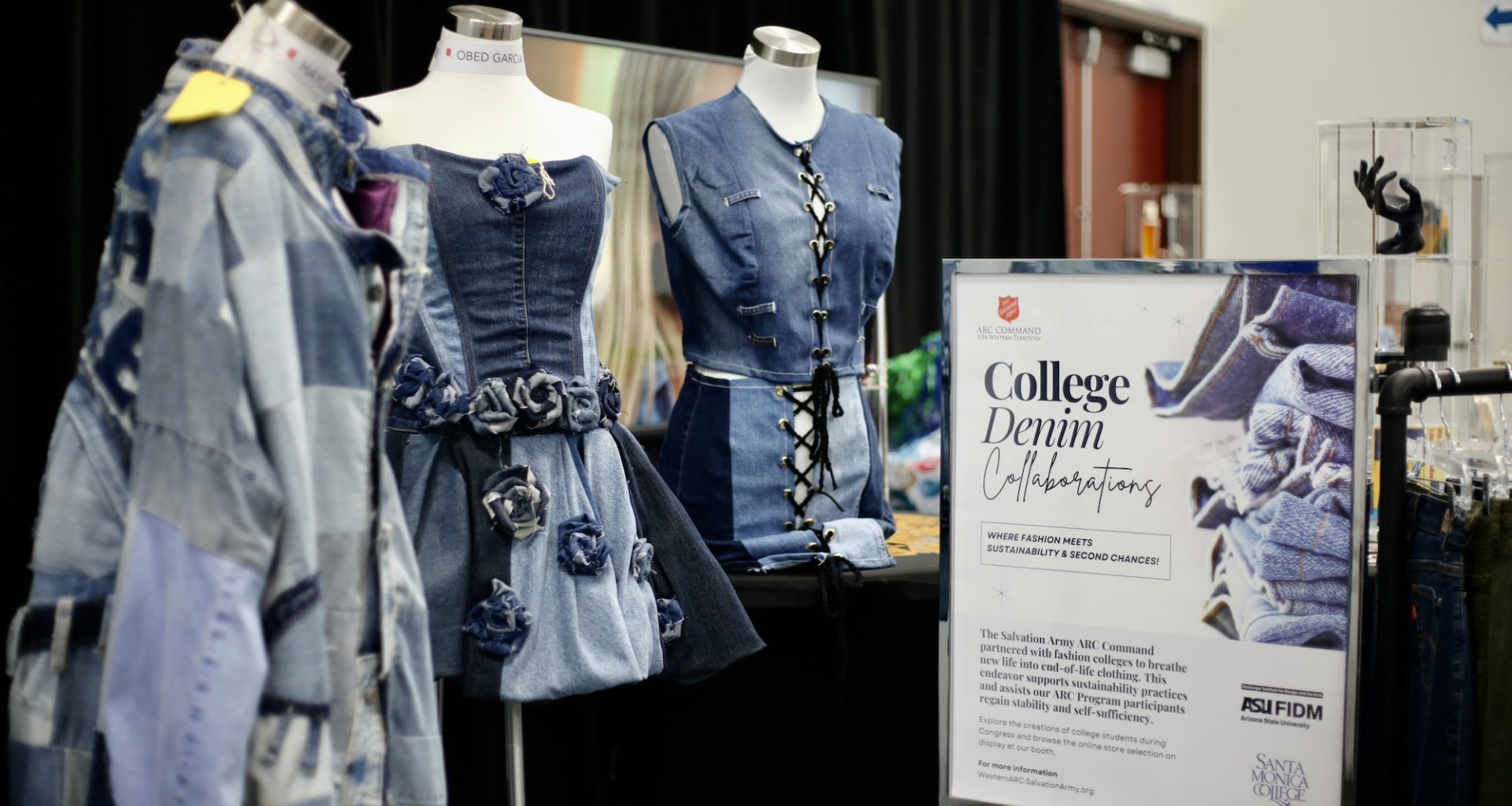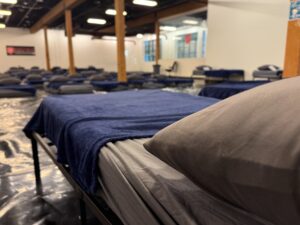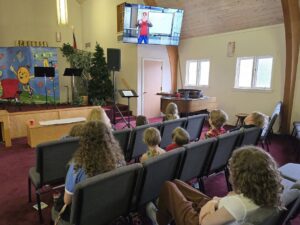Music blared at a Santa Monica (California) College courtyard in mid-June, providing a steady beat for a parade of models showing off couture created by the college’s design students.
As the models strutted around the final corner of the runway, they each passed a line of five mannequins sporting denim looks—a corset, collar, coat and several dresses—also designed by students.
But unlike other designs on the runway, the denim pieces weren’t completely new. Originally, their material came from denim jeans and jackets donated to The Salvation Army. When the clothes didn’t sell at Salvation Army Thrift Stores, Bianca Nemtoc, Regional Donations Coordinator for The Salvation Army Adult Rehabilitation Center (ARC) Command, delivered them to Santa Monica College with a challenge in mind.
Nemtoc asked students to resurrect 150 pieces of end-of-life denim as fresh fashion. The three best pieces would win $200, $100 and $50 prizes and be displayed at The Salvation Army Testify Congress, hosted June 14-16 in Pasadena, California.
The project aimed to raise awareness for the ARCs, residential programs supported by Salvation Army Thrift Stores, that provide spiritual, emotional and social assistance to individuals who are experiencing a variety of challenges, including issues relating to substance abuse.
“I am very convinced this is something that can blossom into something bigger than we can expect or hope for.”
Bianca Nemtoc, Regional Donations Coordinator for The Salvation Army ARC Command
The design challenge, entitled “Transformed Treasures,” felt personal to Nemtoc. She graduated from the Anaheim (California) ARC Jan. 17.
“The way it translates to me is very similar to the mission in the rehabilitation department,” Nemtoc said. “To transform broken people, like the jeans.”
Obed Garcia, who claimed the second place prize, said Nemtoc’s story provided direct inspiration for his design—a pleated denim mini-dress adorned with roses.
“I love the idea that you can go through hell and come out smelling like roses,” Garcia said.
The Salvation Army’s mission to provide second chances also resonated with Hayleigh Smith, whose four-piece design took home first place.
“I pretty much only thrift, mostly because of where I came from,” said Smith, who grew up in California’s Central Valley. “I never really got to buy clothing, so thrifting was my shopping experience.”
“The community I grew up in…had a lot of halfway houses and a lot of rehabilitation centers and being able to see that in the community and be a part of that is great,” she said.
In addition to providing second chances for community members, the challenge also provided an opportunity to address deepening concerns about the fashion industry’s environmental impact.

An analysis by McKinsey found the fashion industry produces 4 percent of the world’s greenhouse gas emissions. And according to the United Nations, every second, enough textiles to fill a garbage truck are brought to a landfill or burned.
Already, The Salvation Army Western Territory extends the life of garments, diverting 52.3 million pounds of textiles from the landfill last year. Transformed Treasures, however, addresses the need for sustainably sourced material to create new garments—without which creating a more eco-friendly industry would be “extremely difficult” according to McKinsey.
Instead of using more resources processing, dyeing and shipping new fabric for each new trend, designers can get creative with pre-worn material, Smith said.
“I noticed a lot of the [donated] pieces were skinny jeans, because those are out of style right now,” she explained. “But there’s a way to cut them and actually double the size and make them a wide leg if you have two of the same pair.”
A hoodie and trench coat designed by Smith demonstrated another potential technique—sewing pieces of old fabric together to make new patterns. Smith even reused fabric scraps from the challenge to create a denim patchwork vest, which she wore to the fashion show.
Atticus Firey, Donations Development Manager for the ARC Command, said he loves how the design challenge magnified young creatives and he hopes to collaborate with more schools in the future.
“Possibilities are endless,” Firey said. “Almost every college has a design program.”
Already, The Salvation Army hosted a smaller challenge with Arizona State University’s Fashion Institute of Design and Merchandising (ASU FIDM), and developed plans to partner with California State University Long Beach and Otis College of Art and Design.
“I am very convinced this is something that can blossom into something bigger than we can expect or hope for,” Nemtoc said. “And that’s a very good thing.”
Do Good:












